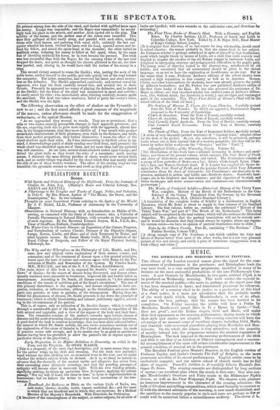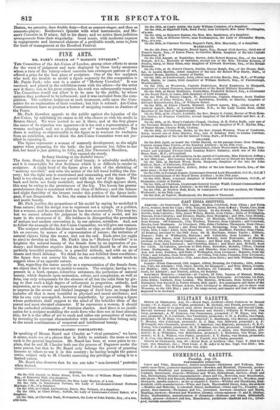MUSIC.
TILE MULL/WHAM AND HEREFORD MUSICAL FESTIVALS.
THE silence of the London musical season gives the signal for the com- mencement of performances in the provinces; and Birmingham leads the way next week, in a very ambitions programme, modelled in many of its features on the most successful productions of the late Philharmonic Con- certs. A new Oratorio by Mendelssohn, in two parts, entitled Elijah, is to be produced on Wednesday morning. This work excites the especial in- terest of the musical public,—the more so, perhaps, as the report goes that it has been despatched in haste, and transmitted piecemeal for rehearsal. The ability of a country choir to do justice to a production of this kind at a short notice, is a more apt speculation than the probable merits of the work itself; which, being Mendelssohn's, is sure of its effect, and none the less, perhaps, that the master has been hurried to its completion. On Friday morning the public will hear a Psalm by Moscheles, Beethoven's grand Mass in 1), a Hymn by Spohr—" God, thou are great"; and the Italian singers, Grisi and Mario, will make their first appearance at the morning performances, singing music to which their style and studies are adapted. The evening concerts will have the advantage of an unusual corps of excellent singers, including Grisi,
and Staudigl ; with occasional pianoforte-playing from Moscheles and Men- delssohn. On the whole, the scheme is very attractive; and the quantity of novelty infused into the programme sustains the musical reputation of Birmingham. The task imposed in the morning performances of the 26th and 28th is not that of an indolent or dilatory management; and a success-. ful accomplishment of the same will evince considerable improvement in the general condition of musical art in the provinces.
The Hereford Festival gives Mozart's Requiem, in the English version of Professor Taylor, and Spohr's Oratorio The Fall of Babylon, as the more prominent novelties of its sacred performances. English artists seem to be exclusively engaged; and our native school of church music has its full share of support. Purcell's Jubilate in D worthily follows Handers Det- tingen Te Deum. The evening concerts are distinguished by long sections of operas,—au excellent plan where the music is first-rate: they also con- tain Mendelssohn's Overture and Fairy music to the Midsummer Night's Dream, as well as his First Walpurgis Night. We observe with pleasure an immense improvement in the character of the evening selections: the bulk of frivolous and trifling compositions, which used formerly to contrast so ill with the elevated selections of the morning, is now much diminished; and the sacrifices to the merely popular in style and taste are perhaps as few as could well be contrived before a miscellaneous auditory. The clever J. L.
Hatton, we perceive, does double duty-first as concert-singer, and then as concerto-player: Beethoven's Quintet with wind instruments, and Mo- zart's Concerto in D minor, fall to his share; and we notice these judicious arrangements from their singularity. Good music, with moderate expense in engagements and increased chances of a profitable result, seem to_form the basis of management at the Hereford Festival.



























 Previous page
Previous page